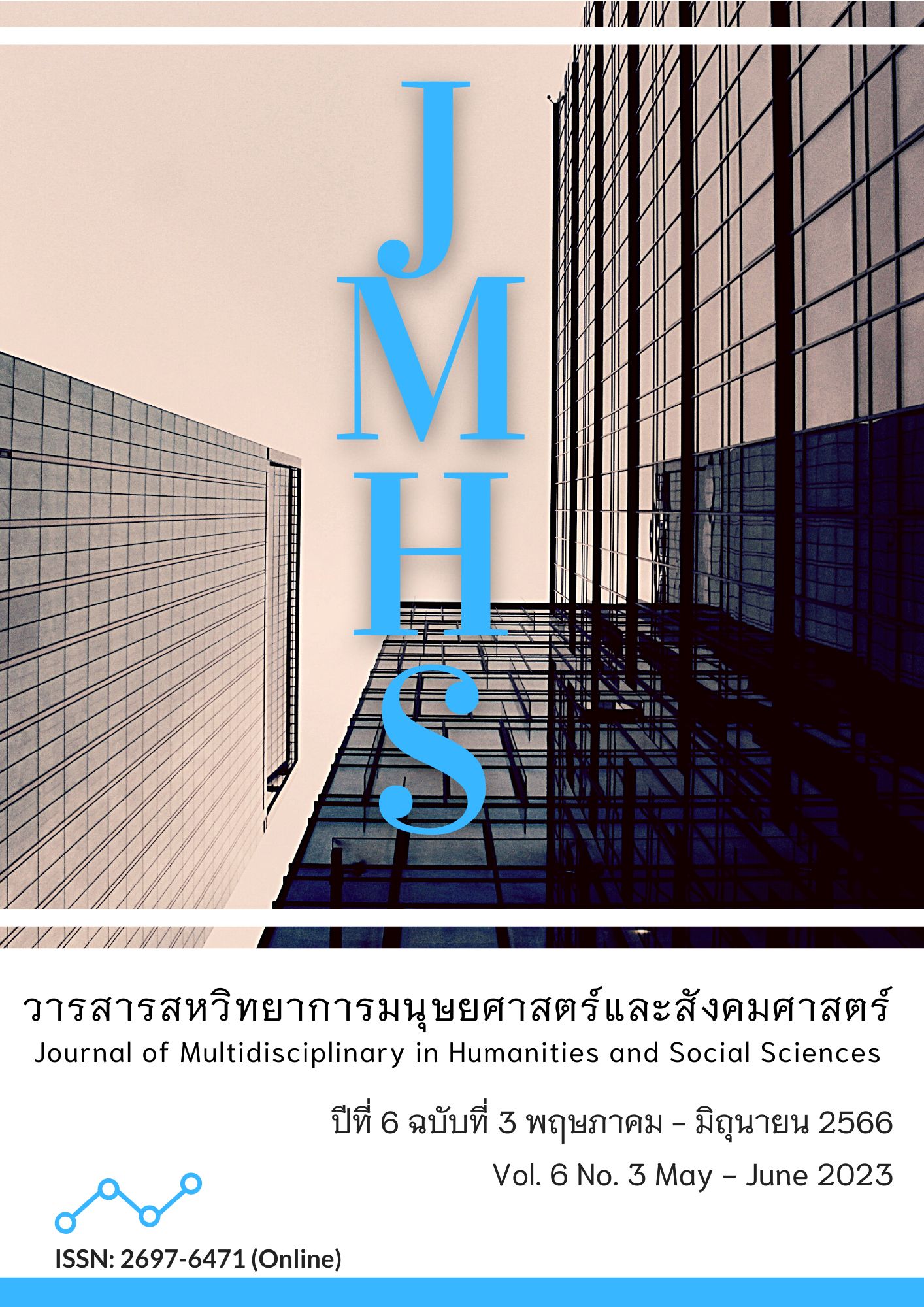Guidelines for Promoting Social Intelligence of Preparatory Higher Education Students’ Kasetsart University Laboratory School, Kamphaeng Saen Campus, Educational Research and Development Center
Main Article Content
Abstract
The objectives of this research were 1) to study the level of social intelligence and the level of factors affecting on the social intelligence; 2) to analyze the factors that affect on the social intelligence; and 3) to present guidelines for enhancing social intelligence of students at preparatory higher education institutions, including Kasetsart University laboratory school, Kamphaeng Saen campus, and the Educational Research and Development Center. The research design was a combined method of research. The sample consisted of 243 students at preparatory higher education institutions selected using multistage random sampling and 15 key informants who were purposively selected. There were 2 types of research tools: 1) questionnaires and 2) question guidelines. Quantitative data were analyzed using basic statistics, Pearson's correlation coefficient analysis, and stepwise multiple regression analysis. The qualitative data were analyzed by content analysis, and a descriptive narrative was written.
The results of this study were as follows: 1) Students at preparatory higher education had overall social intelligence at a high level, and the level of variables that affected social intelligence was all at a high level. 2) Factors affecting the social intelligence of students were found to be three variables, namely, coping problem style, learning adaptation, and the teaching and learning atmosphere, which could explain that the students' social intelligence was at 72.00 percent. 3) Guidelines for promoting students’ social intelligence consisted of 4 main important approaches which were that schools should organize activities that could (1) pay attention to people and surroundings, (2) develop communication skills, (3) promote students' acceptance of individual differences, and (4) encourage students to have empathy and sympathy for others.
Article Details

This work is licensed under a Creative Commons Attribution-NonCommercial-NoDerivatives 4.0 International License.
Views and opinions appearing in the Journal it is the responsibility of the author of the article, and does not constitute the view and responsibility of the editorial team.
References
กระทรวงศึกษาธิการ. (2551). ตัวชี้วัดและสาระการเรียนรู้แกนกลางกลุ่มสาระการเรียนรู้ตามหลักสูตรแกนกลางการศึกษาขั้นพื้นฐาน พ.ศ. 2551. กรุงเทพฯ: โรงพิมพ์ชุมนุมสหกรณ์การเกษตรแห่งประเทศไทย.
กาญจน์กมล สุวิทยารัตน์. (2557). การศึกษาและพัฒนาความฉลาดทางสังคมของนักศึกษาในสถาบันอุดมศึกษาในภาคใต้(วิทยานิพนธ์การศึกษาดุษฎีบัณฑิต). มหาวิทยาลัยศรีนครินทรวิโรฒ.
ดุษฏี เล็บขาว. (2559). การพัฒนาเชาวน์สังคมของนักเรียนวัยรุ่นโดยการปรึกษากลุ่มแบบบูรณาการ(วิทยานิพนธ์ปรัชญาดุษฎีบัณฑิต). มหาวิทยาลัยบูรพา.
ทัชชา สุริโย. (2559). ผลของโปรแกรมการให้คำปรึกษากลุ่มที่มีต่อการเสริมสร้างความฉลาดทางสังคมในวัยรุ่นกลุ่มเสี่ยงต่อภาวะซึมเศร้า(วิทยานิพนธ์ศิลปศาสตรมหาบัณฑิต). มหาวิทยาลัยศรีนครินทรวิโรฒ.
ปาณิศา คงสมจิตต์. (2559). ความฉลาดทางสังคม (SQ) ในยุคศตวรรษที่ 21. สืบค้นจากhttp://www.council.mju.ac.th/openFile.aspx?id=MTceMjlz
ผ่องพรรณ ตรัยมงคลกูล และสุภาพ ฉัตราภรณ์. (2555). การออกแบบการวิจัย. กรุงเทพฯ: สำนักพิมพ์มหาวิทยาลัยเกษตรศาสตร์.
พงษ์ศักดิ์ น้อยพยัคฆ์. (2555). Social intelligence: ปฏิบัติการสร้างทักษะสังคมให้เด็กเก่ง. กรุงเทพฯ: รักลูกกรุ๊ป.
พสุ เดชะรินทร์. (2549). โครงการพัฒนาการเป็นองค์การที่มีขีดสมรรถนะสูง. ในรายงานผลการศึกษาพัฒนารูปแบบเบื้องต้นของหน่วยงานภาครัฐ: องค์การที่มีขีดสมรรถนะสูงสำหรับสำนักงานคณะกรรมการพัฒนาระบบราชการ. กรุงเทพฯ: คณะพาณิชยศาสตร์และการบัญชี จุฬาลงกรณ์มหาวิทยาลัย.
โรงเรียนสาธิตแห่งมหาวิทยาลัยเกษตรศาสตร์ วิทยาเขตกำแพงแสน. (2564). บันทึกข้อความเสนอลงโทษนักเรียน: แบบบันทึกกรณีนักเรียนทำผิดระเบียบ. นครปฐม: โรงเรียนสาธิตแห่งมหาวิทยาลัยเกษตรศาสตร์ วิทยาเขตกำแพงแสน.
วิจารณ์ พานิช. (2556). การสร้างการเรียนรู้สู่ศตวรรษที่ 21. กรุงเทพฯ: มูลนิธิสยามกัมมาจล.
ศิริญพร บุสหงส์, ชนัดดา แนบเกษร และ จิณห์จุฑา ชัยเสนา ดาลลาส. (2562). ปัจจัยที่มีความสัมพันธ์กับความฉลาดทางสังคมของนักศึกษาพยาบาล. วารสารวิชาการมหาวิทยาลัยการจัดการและเทคโนโลยีอีสเทิร์น, 16(1), 26-38.
อริสา แก้วลี. (2561). แนวทางการส่งเสริมกระบวนการเรียนรู้ระหว่างครอบครัวและโรงเรียนในการพัฒนาความฉลาดทางสังคมของเด็กวัยรุ่นตอนต้นในกรุงเทพมหานคร(วิทยานิพนธ์การศึกษามหาบัณฑิต). จุฬาลงกรณ์มหาวิทยาลัย.
อรุณประภาส์ ธนกิจโกเศรษฐ์. (2558). ความฉลาดการคิดและการพัฒนาตนเอง. สืบค้นจาก http://www.forest.go.th/psdg/index.php?optiom=com_docman&Itemid=409&task=doc_download&gid=462&lang=en
อัฐฉญา แพทย์ศาสตร์ และ พัชรินทร์ รุจิรานุกูล. (2563). แนวทางส่งเสริมความฉลาดทางสังคมของนักศึกษาครูมหาวิทยาลัยราชภัฏรำไพพรรณี. วารสารวิชาการศรีปทุม ชลบุรี, 16(1), 145-154.
Albrecht, K. (2006). Social Intelligence: The New Science of Success. San Francisco: Jossey-Bass A Wiley Imprint.
Babu, M.S. (2007). Social Intelligence Among Senior Secondary School Student: A Comparative Sketch. Retrieved September 23, 2022 from http://eric.ed.gov/?id=ED50048
Bar-On, R. (2006). The Bar-On Model of Emotional-social Intelligence (ESI). Psicothema, 18, 13-25. Retrieved September 23, 2022 from https://www.psicothema.com/pdf/3271.pdf
Meijs, N. et al. (2010). Social Intelligence and Academic Achievement as Predictors of Adolescent. Journal of Youth and Adolescence, 39(1), 62–72. https://doi.org/10.1007/s10964-008-9373-9
Silvera, H.D., Martinussen, M., & Dahl, T.I. (2001). The Tromso Ssocial Intelligence Scale, A Self-report Measure of Social Intelligence. Scandinavian Journal of Psychology, 42, 313-319. https://doi.org/10.1111/1467-9450.00242SourcePubMed


